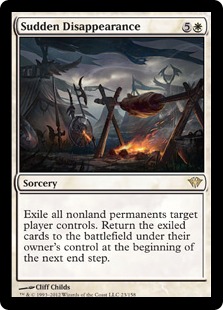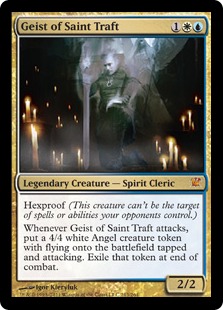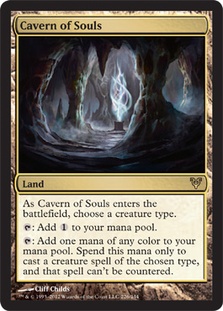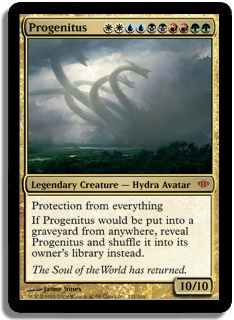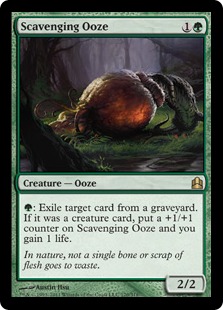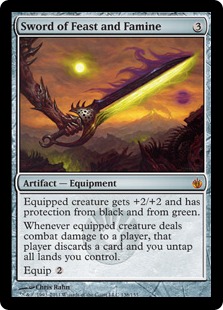Hey there!
My name’s Kim Warren; I’m an English Level 3 judge and the judge regional coordinator for the UK, Ireland, and South Africa (I’ve been assured that there are reasons for this grouping!). Chances are that a fair few of you have seen me at a tournament somewhere. I’ve been present at every GP in Europe (playing or judging) for two years, and in the last year or so I have also been to the USA, Canada, and Malaysia to judge at SCG Open Series, Grand Prix, and Pro Tours.
Being a part of so many tournaments has led me to notice that it is not uncommon to find players at Competitive REL events who don’t really know how to recognize a triggered ability. Back when you were required to call a judge whenever you noticed that your opponent had made any mistake, this wasn’t too much of a problem. However, missed triggers are now an exception to this rule; if you notice your opponent has missed a triggered ability that they control, you can choose not to say anything. Intentionally doing the same thing with any other illegal action you notice during a game is Cheating — Fraud and can get you disqualified from the tournament!
This means that a player who doesn’t fully recognize the difference between triggered abilities and other types of abilities can inadvertently get themselves into a lot of trouble if they choose not to call a judge for an illegal action which turns out not to be a missed trigger. This isn’t fun for anyone involved. As such, I’m writing this article to provide a short guide of how to quickly recognize triggered abilities and to highlight a few traps in the hopes that it can help reduce the number of people who accidentally break the rules in this way.
The Policy
Just so that we are all starting in the same place!
Missed triggers are the only exception to the policy which requires you to call a judge if you notice that something has gone wrong during a match of tournament Magic. At Competitive and Professional REL, while you are not allowed to ignore or ‘forget’ triggered abilities that you control, you are not responsible for your opponent’s triggered abilities. If you notice that your opponent has missed a triggered ability, you have the option to say nothing and allow it to pass unnoticed or to call a judge who will deal with it according to whether the trigger is considered to be beneficial or detrimental to its controller.
In a Nutshell
Triggered abilities start with one of these words: ‘when,’ ‘whenever,’ or ‘at’. If these words are absent at the beginning of the text of an ability then what you are looking at is not a triggered ability. If something goes wrong with an effect which is not a triggered ability, you should call a judge immediately!
The Exception
Some spells or abilities can set up delayed triggered abilities, which will do something later on than the point that the original spell or ability resolves. These delayed triggered abilities do not normally start with the words ‘when,’ ‘whenever,’ or ‘at,’ but will normally contain one of these within the text of the ability.
Common Mistakes
There are a variety of other abilities which are commonly mistaken for triggered abilities.
Abilities which start with ‘as’ (‘As Cavern of Souls enters the battlefield’) or ‘if’ (‘If Progenitus would be put into a graveyard from anywhere’) look a lot like triggered abilities but are actually replacement effects—a kind of continuous effect. Rather than triggering off an event that has just happened, they partially or completely replace an event with something different.Â
Activated abilities can sometimes do a whole lot of things, some of which may be dependent on what happened earlier in the resolution of the ability or other aspects of the game state. Activated abilities are written cost: effect; everything written continuously after the colon is part of the effect of the activated ability. In the case of Scavenging Ooze, this means that the clause about putting a counter on it and gaining one life if the exiled card was a creature is still a part of the activated ability rather than being a separate triggered ability.
Some triggered abilities have multiple parts to them, such as the Swords cycle. If your opponent meets the trigger condition and misses the ability entirely, that’s fine; you are under no obligation to take any action. However, if a player resolves part of the ability, then they are not considered to have missed the trigger, even if the other part of the effect got overlooked! Your opponent hitting you with a creature carrying a Sword of Feast and Famine, instructing you to discard, and then failing to untap their lands is therefore not a missed trigger.
Spells such as Glorious Charge generate continuous effects. These effects last from the point that the spell resolves until the end of any stated duration and can’t legally be forgotten about. Mistakes involving the handling of continuous effects (including replacement effects) and activated abilities such as shown in these examples normally fall into the Game Rule Violation category of infractions; if either player in a game commits a Game Rule Violation, you should call a judge as soon as the error is noticed. This means that the judge is likely to be able to fix the problem and allow the game to continue, and it also means that there is no risk of you accidentally getting yourself disqualified for Fraud.
Final Thoughts
There is always a lot going on in a game of Magic, and when you have so many interactions between cards and between players, it’s very easy for things to go wrong. While I’ve provided a quick guide here, sometimes you still aren’t going to be sure if you should call a judge for something or not. The best rule of thumb to stay on the right side of the line is when in doubt, call a judge—we’re here to help, after all! If you’re worried that doing so will give your opponent an indication that something is up, we’re more than happy to talk to you away from the table; pretending that you want to ask a question about a card in your hand until we’re a safe distance away is a good tactic here to avoid giving away strategic information.
I hope this helps to give you a better understanding of how to recognize different types of abilities! Good luck in all your tournaments, and if you see me in a conference hall sometime, feel free to come and say hi!

